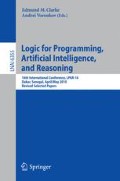Abstract
We study strategy improvement algorithms for mean-payoff and parity games. We describe a structural property of these games, and we show that these structures can affect the behaviour of strategy improvement. We show how awareness of these structures can be used to accelerate strategy improvement algorithms. We call our algorithms non-oblivious because they remember properties of the game that they have discovered in previous iterations. We show that non-oblivious strategy improvement algorithms perform well on examples that are known to be hard for oblivious strategy improvement. Hence, we argue that previous strategy improvement algorithms fail because they ignore the structural properties of the game that they are solving.
Access this chapter
Tax calculation will be finalised at checkout
Purchases are for personal use only
Preview
Unable to display preview. Download preview PDF.
References
Björklund, H., Sandberg, S., Vorobyov, S.: A discrete subexponential algorithm for parity games. In: Alt, H., Habib, M. (eds.) STACS 2003. LNCS, vol. 2607, pp. 663–674. Springer, Heidelberg (2003)
Björklund, H., Vorobyov, S.: A combinatorial strongly subexponential strategy improvement algorithm for mean payoff games. Discrete Applied Mathematics 155(2), 210–229 (2007)
Condon, A.: On algorithms for simple stochastic games. In: Cai, J.-Y. (ed.) Advances in Computational Complexity Theory. DIMACS Series in Discrete Mathematics and Theoretical Computer Science, vol. 13, pp. 51–73. American Mathematical Society, Providence (1993)
Emerson, E.A., Jutla, C.S., Sistla, A.P.: On model-checking for fragments of μ-calculus. In: Courcoubetis, C. (ed.) CAV 1993. LNCS, vol. 697, pp. 385–396. Springer, Heidelberg (1993)
Friedmann, O.: A super-polynomial lower bound for the parity game strategy improvement algorithm as we know it. In: Logic in Computer Science (LICS). IEEE, Los Alamitos (2009)
Friedmann, O.: A super-polynomial lower bound for the parity game strategy improvement algorithm as we know it (January 2009) (preprint)
Howard, R.: Dynamic Programming and Markov Processes. Technology Press and Wiley (1960)
Jurdziński, M., Paterson, M., Zwick, U.: A deterministic subexponential algorithm for solving parity games. In: Proceedings of ACM-SIAM Symposium on Discrete Algorithms, SODA 2006, pp. 117–123. ACM/SIAM (2006)
Khachiyan, L., Gurvich, V., Zhao, J.: Extending dijkstras algorithm to maximize the shortest path by node-wise limited arc interdiction. In: Grigoriev, D., Harrison, J., Hirsch, E.A. (eds.) CSR 2006. LNCS, vol. 3967, pp. 221–234. Springer, Heidelberg (2006)
Liggett, T.M., Lippman, S.A.: Stochastic games with perfect information and time average payoff. SIAM Review 11(4), 604–607 (1969)
Mansour, Y., Singh, S.P.: On the complexity of policy iteration. In: Laskey, K.B., Prade, H. (eds.) UAI 1999: Proceedings of the Fifteenth Conference on Uncertainty in Artificial Intelligence, pp. 401–408. Morgan Kaufmann, San Francisco (1999)
Puri, A.: Theory of Hybrid Systems and Discrete Event Systems. PhD thesis, University of California, Berkeley (1995)
Schewe, S.: An optimal strategy improvement algorithm for solving parity and payoff games. In: Kaminski, M., Martini, S. (eds.) CSL 2008. LNCS, vol. 5213, pp. 369–384. Springer, Heidelberg (2008)
Stirling, C.: Local model checking games (extended abstract). In: Lee, I., Smolka, S.A. (eds.) CONCUR 1995. LNCS, vol. 962, pp. 1–11. Springer, Heidelberg (1995)
Vöge, J., Jurdziński, M.: A discrete strategy improvement algorithm for solving parity games (Extended abstract). In: Emerson, E.A., Sistla, A.P. (eds.) CAV 2000. LNCS, vol. 1855, pp. 202–215. Springer, Heidelberg (2000)
Zwick, U., Paterson, M.: The complexity of mean payoff games on graphs. Theoretical Computer Science 158(1-2), 343–359 (1996)
Author information
Authors and Affiliations
Editor information
Editors and Affiliations
Rights and permissions
Copyright information
© 2010 Springer-Verlag Berlin Heidelberg
About this paper
Cite this paper
Fearnley, J. (2010). Non-oblivious Strategy Improvement. In: Clarke, E.M., Voronkov, A. (eds) Logic for Programming, Artificial Intelligence, and Reasoning. LPAR 2010. Lecture Notes in Computer Science(), vol 6355. Springer, Berlin, Heidelberg. https://doi.org/10.1007/978-3-642-17511-4_13
Download citation
DOI: https://doi.org/10.1007/978-3-642-17511-4_13
Publisher Name: Springer, Berlin, Heidelberg
Print ISBN: 978-3-642-17510-7
Online ISBN: 978-3-642-17511-4
eBook Packages: Computer ScienceComputer Science (R0)

